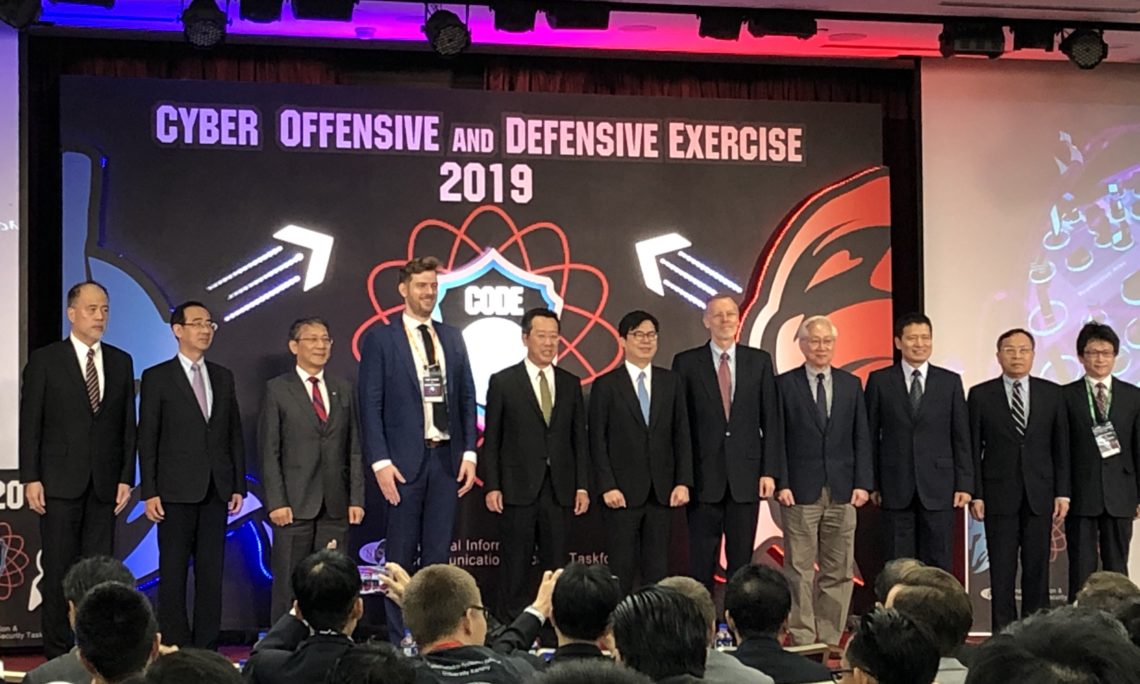OT-1983
November 6, 2019
Remarks by AIT Director W. Brent Christensen at
The Opening Session of the Taiwan-led part of the
2019 Cyber Offensive and Defensive Exercises
November 6, 2019
(As Prepared for Delivery)
Vice Premier Chen, Chairman Koo, Director General Jyan, distinguished guests, ladies and gentlemen, zao an!
I am very pleased to be here today to help kick-off the Taiwan-led portion of the 2019 Cyber Offensive and Defensive Exercises, or CODE. As many have pointed out this week, this year marks the first time the United States and Taiwan have co-organized and co-hosted international cyber exercises. In doing so, our message to the world is this: Taiwan is not alone on cyber. The United States stands with you, side by side, as a friend and partner. Every country that values a free and open internet should join us in partnering with Taiwan to collectively bolster our respective cyber defenses. Taiwan is a reliable and highly capable partner, and we are eager to deepen our cooperation across all dimensions of cybersecurity.
As my colleague AIT Deputy Director Greene pointed out on Monday, one of the most significant risks today comes from cyber threats to our industry, to our critical infrastructure, and to our democracies. Together, we must protect our intellectual property from cyber theft, our infrastructure from sabotage, and our democracies from interference by authoritarian states.
I just returned from the Indo-Pacific Business Forum in Bangkok where high-level public and private sector representatives from around the Indo-Pacific, including from Taiwan, gathered to discuss how we can concretely work together to realize a shared vision of a free and open Indo-Pacific. Free means freedom from coercion. Each partner within the Indo-Pacific has not only its own unique history, culture, and economy, but also the fundamental right to chart its own path free from coercion in the international sphere. Open means freedom at home – both politically and economically. Democracies and market economies emerge from the same fundamental principle – a free people can self-organize and adapt more creatively and more dynamically than any system that prioritizes conformity and whose bottom line is political loyalty to an unelected elite.
Freedom internationally and openness at home are actually two sides of the same coin, and one cannot exist without the other. Those who promote openness at home, seek freedom in the world; those who seek to control at home, bully their neighbors in the world. This observation is not surprising. A society that is repressive at home is structurally incapable of genuinely promoting freedom abroad.
And this is what makes Taiwan such an important partner in the Indo-Pacific. Taiwan belongs to the family of democracies and is an essential part of the free and open Indo-Pacific. Promoting freedom abroad and openness at home are now part of Taiwan’s cultural DNA.
In an effort to help expand commercial opportunities in the Indo-Pacific, we work closely with Taiwan friends like the Taiwan External Trade Development Council, or TAITRA, to capitalize on the rapidly shifting global supply chains to deepen U.S.-Taiwan commercial cooperation in Southeast Asia. To help foster a vibrant digital economy in the Indo-Pacific, we discuss our ongoing cooperation with Taiwan in APEC, the Internet Governance Forum, and here in Taiwan through the Digital Economy Forum. It is clear that Taiwan already embodies almost everything the United States looks for in an Indo-Pacific partner. The U.S. Government and our private sector are looking for trusted partners that share our values. Whether it be infrastructure projects in third countries or our technical cooperation on topics ranging from export controls to global health, Taiwan is plugged into every major component of our economic strategy and playing an active role.
But in the digital age, all of this partnership fundamentally depends upon close cybersecurity cooperation. Commercial opportunities cannot expand if intellectual property and trade secrets are not safe. Just as a physical economy depends upon physical security, so too a digital economy depends upon cyber security. Energy sustainability and infrastructure development require secure networks. On this basis, I think we can accurately say that cybersecurity is, for all practical purposes, an essential foundation for the U.S.-Taiwan Indo-Pacific Partnership.
As we move forward to the next phase of the CODE exercise, I look forward to strengthening cyber security cooperation among the United States, Taiwan and likeminded partners in our ongoing effort to sustain a free and open Indo-Pacific.
Thank you.
















![Video Thumbnail [Recovered]-01](../wp-content/uploads/sites/269/Video-Thumbnail-Recovered-01-1-750x450.jpg)






